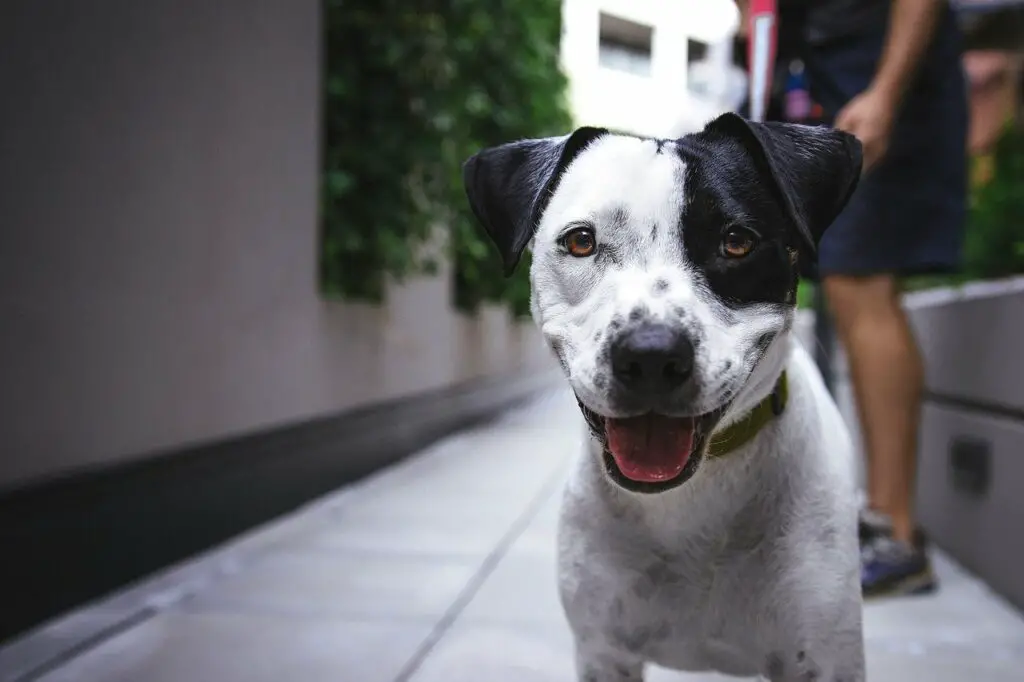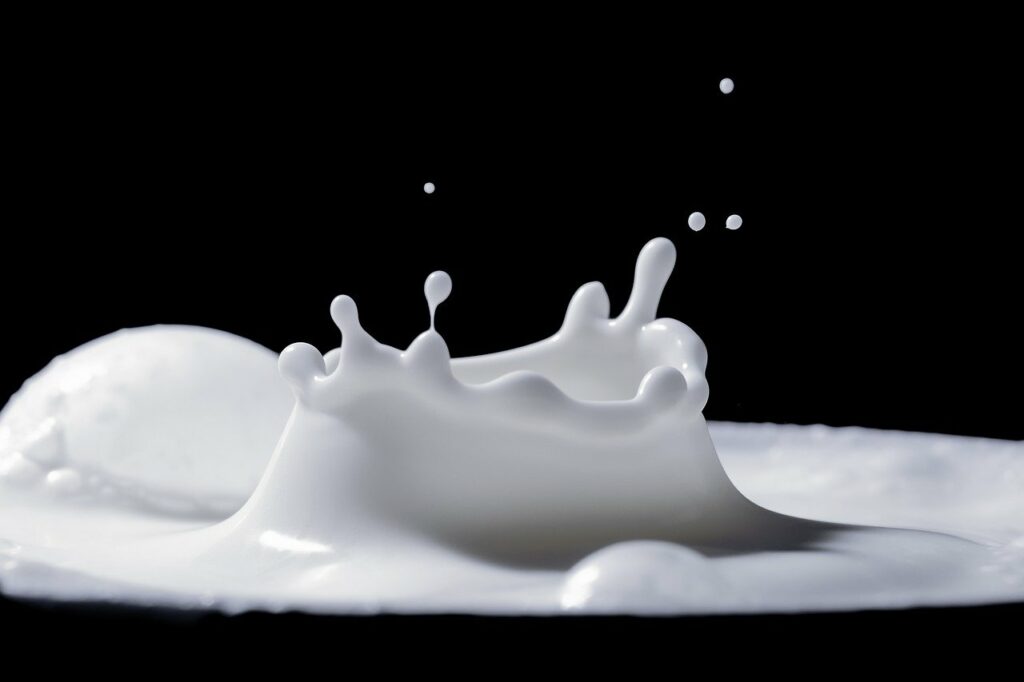Dogs depend on their parents for provision and care.
If you own a cat, you’ll agree that they love milk.
Watching your feline drink milk, you’ll probably wonder whether dogs will be safe after consuming cat milk.
So, can dogs drink cat milk?
No, dogs cannot drink cat milk because it’s high in fats and contains lactose.
Moreover, cat milk is manufactured for cats’ digestive systems and can cause digestion issues like diarrhea in dogs.
It’s essential to know the risks associated with feeding your furry friend cat milk.
You also want to know safer alternatives to cat milk for your pup.
Keep reading to learn more about the dangers of feeding your dog cat milk and what you can give them instead.

What is Cat Milk?
The cat milk under discussion is not one that comes from nursing adult cats. In this context, cat milk refers to commercial milk products designed for cats and kittens.
These milk products contain all the nutrients felines need to survive and thrive.
As you can imagine, cat milk differs from cow’s or goat’s milk meant for human consumption.
For one thing, cat milk has more fat than any other type of milk. It also has a higher protein and mineral content.
Risks of Cat Milk to Dogs
Besides containing lactose, cat milk is high in fats.
For these reasons, cat milk is unsafe for dogs and can lead to the following:
Diarrhea
Dairy products contain lactose, an indigestible sugar for dogs.
Dogs react differently to this sugar, with some being less capable of handling it.
Such dogs are more susceptible to the side effects of lactose, and a lick of cat milk can cause gastrointestinal upset.
If your dog can’t handle lactose, giving him cat milk will lead to a bout of diarrhea.
Diarrhea is a runny stool that can lead to dehydration if not treated promptly.
Dehydration
As mentioned, diarrhea caused by cat milk can dehydrate your dog quickly.
Dehydration occurs when there’s an imbalance of water in the body.
The water may be lost through vomiting or diarrhea.
Symptoms of dehydration include sunken eyes, lethargy, and dry gums.
It’s essential to seek professional help if your dog is dehydrated.
Dehydration can cause organ damage and even death if not treated on time.
Pancreatitis
Pancreatitis is a condition characterized by the inflammation of the pancreas.
The pancreas is an organ behind the stomach that produces enzymes that help in digestion.
Cat milk can cause pancreatitis in dogs because it’s high in fats.
Your dog may suffer from acute or chronic pancreatitis.
Acute pancreatitis comes on suddenly and may last for a few days.
It’s characterized by the following symptoms:
- Vomiting
- Lethargy
- Fever
- Diarrhea
- Dehydration
Chronic pancreatitis is a long-term condition characterized by recurring episodes of acute pancreatitis.
The symptoms are similar to those of acute pancreatitis, but they’re more severe.
Discomfort
Your dog may be uncomfortable after drinking cat milk.
The milk may cause an upset stomach, gas, bloating, and abdominal pain.
These symptoms will go away on their own.
You can help your dog feel better by feeding him small meals and avoiding dairy products.
Weight Gain
Cat milk is high in fats and calories, which can lead to weight gain in dogs.
If your dog is overweight, he’s at risk of developing obesity and other health problems.
Obesity is a severe condition caused by an excess of body fat.
It can lead to the following:
- Arthritis
- High blood pressure
- Heart disease
- Diabetes

Can Puppies Drink Kitten Milk?
No, puppies should not drink kitten milk.
Kitten milk is even higher in fat than cat milk and can cause pancreatitis in puppies.
Moreover, the milk doesn’t have the right balance of nutrients that puppies need to grow and develop properly.
Although kitten milk is low in lactose, it can still cause lactose intolerance in puppies.
Thus, the label that the milk is low in lactose should not encourage you to give your puppy kitten milk.
Can Dogs Drink Cow Milk?
No, dogs should not drink cow milk.
As a dairy product, cow milk is high in lactose.
Dogs are lactose-intolerant, which means they can’t digest lactose properly.
When dogs drink cow milk, they may experience the following side effects:
- Diarrhea
- Vomiting
- Bloating
- Gas
Safer Alternatives to Cat Milk for Dogs
Now that cat milk is unsafe for your furry friend, what can you give him instead?
There are many safe and healthy alternatives to cat milk for dogs.
These include:
- Water
- Coconut water
- Soy milk
- Almond milk
- Homemade dog milk replacer
- Oat milk
- Commercially available dog milk replacers
These alternatives will keep your dog hydrated and help him grow and develop properly.
However, it’s always advisable to consult your vet before giving your dog any new food or drink.
If you’re introducing a new drink or food to your dog’s diet, do so gradually as you monitor the reaction.
Look for symptoms like diarrhea, bloating, and vomiting after giving the dog a new food.
If your dog does not portray these symptoms, you can increase the amount of the new food or drink.
Frequently Asked Questions
Can dogs drink kittens’ milk?
No, dogs should not drink kitten milk.
The milk is high in protein which can cause diarrhea in dogs.
Plant-based milk like soy is a safer alternative.
Is dog and cat milk the same?
No, cat milk is high in protein compared to dog milk.
On the other hand, dog milk has more iron than cat milk.
Why is milk bad for dogs?
Dairy milk is bad for dogs because it contains lactose.
Dogs are lactose-intolerant, which can cause gastrointestinal issues if they drink milk.
Bottom Line
Dogs should not drink cat milk as it’s high in fats, contains lactose, and is meant for cats.
Giving your pup cat milk exposes him to pancreatitis, gastrointestinal upset, and weight gain.
These problems are more severe in puppies since their systems are still developing.
Water, soy milk, and homemade dog milk replacer are some of the safe alternatives to cat milk for dogs.
If you’re unsure what to give your dog, always consult your veterinarian first.
- What Dog Breeds Have Pink Skin? - March 24, 2023
- What Are the Most Inspiring Dog Breeding Quotes? - March 20, 2023
- Can Pheromone Spray Help Improve Dog Breeding Results? - March 19, 2023








